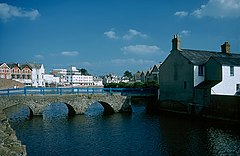Bude
Bude
|
|
|---|---|
 |
|
| Bude shown within Cornwall | |
| OS grid reference | SS215065 |
| Civil parish | |
| Unitary authority | |
| Ceremonial county | |
| Region | |
| Country | England |
| Sovereign state | United Kingdom |
| Post town | BUDE |
| Postcode district | EX23 |
| Dialling code | 01288 |
| Police | Devon and Cornwall |
| Fire | Cornwall |
| Ambulance | South Western |
| EU Parliament | South West England |
| UK Parliament | |
| Website | www.visitbude.info |
Bude (b-yew-d, Cornish: Porthbud) is a small seaside resort town in north Cornwall, England, UK, in the civil parish of Bude-Stratton and at the mouth of the River Neet (also known locally as the River Strat). It is sometimes formerly known as Bude Haven. It lies southwest of Stratton, south of Flexbury and Poughill, and north of Widemouth Bay and is located along the A3073 road off the A39. Bude is twinned with Ergué-Gabéric in Brittany, France. Bude's coast faces Bude Bay in the Celtic Sea, part of the Atlantic Ocean. The population of the civil parish can be found under Bude-Stratton.
Its earlier importance was as a harbour, and then a source of sea sand useful for improving the moorland soil. The Victorians favoured it as a watering place, and it was a popular seaside destination in the 20th century.
It lies just south of Flexbury and north of Widemouth Bay and is located along the A3073 road off the A39 road.
A section of Bude's coast which is located between Compass Cove to the south and Furzey Cove to the north, is a SSSI (Site of Special Scientific Interest) noted for its geological and biological interest.Carboniferous sandstone cliffs surround Bude. During the Variscan Orogeny the strata were heavily faulted and folded. As the sands and cliffs around Bude contain calcium carbonate (a natural fertiliser), farmers used to take sand from the beach, for spreading on their fields. The cliffs around Bude are the only ones in Cornwall that are made of Carboniferous sandstone, as most of the Cornish coast is formed of Devonian slate, granite and Precambrian metamorphic rocks. The stratified cliffs of Bude give their name to a sequence of rocks called the Bude Formation. Many formations can be viewed from the South West Coast Path which passes through the town.
...
Wikipedia

